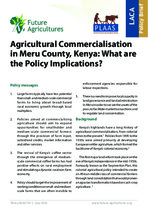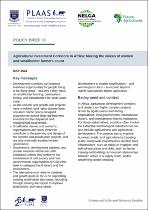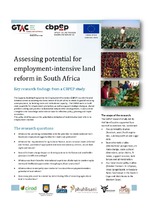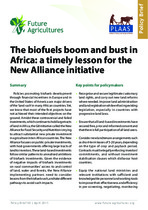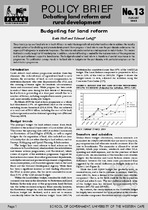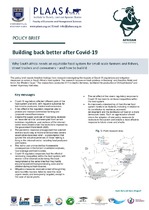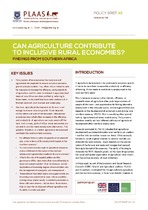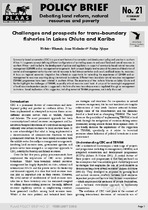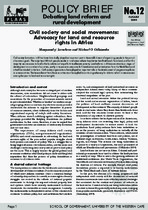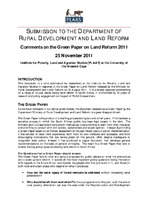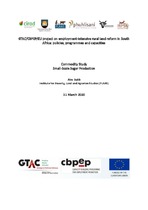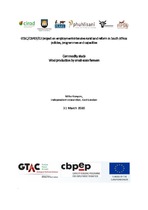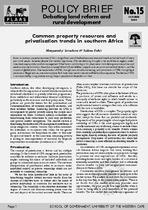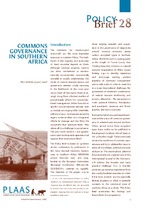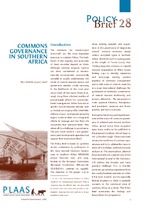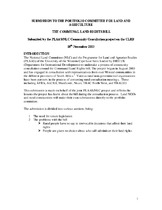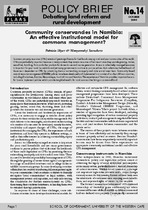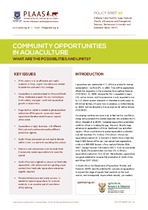Browsing Policy Briefs by Title
Now showing items 1-20 of 144
-
Agricultural commercialisation in Meru County, Kenya: What are the policy implications?
(Institute for Poverty, Land and Agrarian Studies, University of the Western Cape, 2016)Kenya’s highlands have a long history of agricultural commercialisation, from colonial times to the present. Policies from 1895 to the 1930s were aimed primarily at developing European settler agriculture, which formed the ... -
Agricultural commercialisation in Meru County, Kenya: What are the policy implications?
(Institute for Poverty Land and Agrarian Studies (PLAAS), 2016)Our study aimed to engage these debates. The study was carried out in Kenya’s Meru County and examined three agricultural farming models: outgrowers, medium-scale commercial farms and a plantation. This was part of the ... -
Agricultural investment corridors in Africa: Making the voices of women and smallholder farmers count
(UWC PLAAS, 2023)Development corridors can improve livelihood opportunities for people living in far-flung areas – but only if they focus on smallholder farming, pastoralism, fishing, and infrastructure for small-scale trade. Land rights ... -
Assessing potential for employment-intensive land reform in South Africa: Key research findings from a CBPEP study
(GTAC, 2020)The Capacity Building Programme for Employment Promotion (CBPEP) is an EU-funded initiative aimed at assisting the Government of South Africa to attain its goal of reducing unemployment, by building state and institutional ... -
The biofuels boom and bust in Africa: A timely lesson for the New Alliance initiative
(Institute for Poverty, Land and Agrarian Studies, University of the Western Cape, 2015)Policies promoting biofuels development through financial incentives in Europe and in the United States of America are major drivers of the ‘land rush’ in many African countries. Yet, we know that most of the first projects ... -
The biofuels boom and bust in Africa: a timely lesson for the New Alliance initiative
(Institute for Poverty Land and Agrarian Studies (PLAAS), 2015)Policies promoting biofuels development through financial incentives in Europe and in the United States of America are major drivers of the ‘land rush’ in many African countries. Yet, we know that most of the first projects ... -
Budgeting for land reform
(Institute for Poverty, Land and Agrarian Studies, University of the Western Cape, 2004)The primary purpose of land reform in South Africa is to redistribute agricultural and other land in order to address the racially skewed pattern of landholding and promote development. Slow progress in land reform over ... -
Building back better after Covid-19: Why South Africa needs an equitable food system for small-scale farmers and fishers, street traders and consumers – and how to build it
(Institute for Poverty Land and Agrarian Studies (PLAAS), 2021)This policy brief reports headline findings from research investigating the impacts of Covid-19 regulations and mitigation measures on actors in South Africa’s food system. The research focuses on fresh produce in Gauteng ... -
Can agriculture contribute to inclusive rural economies?
(Institute for Poverty, Land and Agrarian Studies, University of the Western Cape, 2015)If agricultural development is to contribute to economic growth, it has to do more than increase the productivity or efficiency of farming. It also needs to contribute to employment in the rural non-farm sector. This ... -
Challenges and prospects for trans-boundary fisheries in Lakes Chiuta and Kariba
(Institute for Poverty, Land and Agrarian Studies, University of the Western Cape, 2006)Community-based conservation (CBC) is a prominent feature of conservation and development policy and practice in southern Africa. It is a generic concept defining different configurations of controlling access to and use ... -
Civil society and social movements: Advocacy for land and resource rights in Africa
(Institute for Poverty, Land and Agrarian Studies, University of the Western Cape, 2004)Civil society formations in Africa have historically played an important part in the establishment of organising people in the pursuit of common goals. The majority of Africa’s people reside in rural areas where they ... -
Comments on the Green Paper on land reform 2011
(Institute for Poverty, Land and Agrarian Studies, University of the Western Cape, 2011)As we have indicated in our earlier press release, the document released as a Green Paper by the Department Ministry of Rural Development and Land Reform is a great disappointment. The Green Paper is the product of a ... -
Commodity Study: Small-Scale Sugar Production
(GTAC, 2020-03-31)The South African sugar industry has long been one of South Africa’s most substantial agro-industries. The South African Sugar Association (SASA) estimates that around R16bn in value is annually created by 85,000 directly ... -
Commodity study: Wool production by small-scale farmers
(GTAC, 2020-03-31)Small-scale wool production, especially in former bantustan areas, has the potential for significant expansion and ongoing and successful farmer support should be expanded. The small proportion of sheep and wool farmers ... -
Common property resources and privatisation trends in Southern Africa
(Institute for Poverty, Land and Agrarian Studies, University of the Western Cape, 2004)Access to common property resources (CPRs) is a significant part of the land resource base and therefore the livelihoods of many poor rural people. However, despite their central importance, CPRs are declining throughout ... -
Commons Governanace in South Africa
(Institute for Poverty, Land and Agrarian Studies, University of the Western Cape, 2009)The commons (or common-pool resources)1 are the most important resources in southern Africa. The livelihoods of the majority and economies of most countries depend on them. Although common property regimes are often ... -
Commons governance in Southern Africa
(PLAAS, University of the Western Cape, 2009-06-28)This Policy Brief is based on synthetic studies undertaken by participants in the Cross Sectoral Commons Governance in Southern Africa (CROSCOG) project between 2007 and 2009, funded by the European Commission (European ... -
The Communal Land Rights Bill
(Institute for Poverty, Land and Agrarian Studies, University of the Western Cape, 2003)Tenure legislation is urgently necessary. There are serious problem in the communal areas in the ex-homeland provinces. These areas are characterised by severe poverty, overcrowding and isolation from economic growth and ... -
Community conservancies in Namibia: An effective institutional model for commons management?
(Institute for Poverty, Land and Agrarian Studies, University of the Western Cape, 2004)Common property resources (CPRs) remain of great significance for livelihoods among rural and poor communities of the world. CPRs are particularly important because in many contexts they remain resources of last resort ... -
Community opportunities in aquaculture, What are the possibilities and limits?
(Institute for Poverty, Land and Agrarian Studies, University of the Western Cape, 2016)Aquaculture now contributes 47% of fish available for human consumption – up from 9% in 1980. This shift to aquaculture offsets the stagnation in the production from capture fisheries (FAO 2012). By 2030, demand for ...

